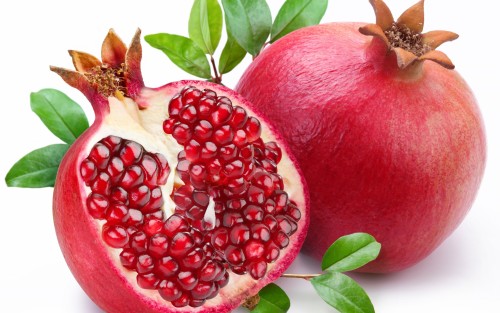Tuesday, February 16, 2016
The February 2016 issue of the journal Complementary Therapies in Clinical Practice published the findings of a randomized, double-blind trial which revealed a reduction in markers of oxidative stress, inflammation and other factors in overweight and obese adults given a pomegranate extract supplement.
The trial included 48 participants assigned to receive 1000 milligrams pomegranate extract or a placebo daily for 30 days. Plasma malondialdehyde (MDA, a marker of lipid peroxidation), high-sensitivity C-reactive protein and interleukin-6 (inflammation markers), serum lipid and glucose levels, and insulin resistance were evaluated at the beginning and end of the trial.
At the end of the treatment period, average serum insulin, glucose, total and low-density lipoprotein cholesterol, plasma MDA, interleukin-6, C-reactive protein, and insulin resistance had significantly decreased from values ascertained before treatment among subjects who received pomegranate extract in comparison with changes that occurred in the placebo group. Additionally, high-density lipoprotein cholesterol increased among those who received pomegranate, while remaining at a similar level in subjects who received a placebo.
“Based on the findings from this study, it can be concluded that pomegranate extract consumption had a beneficial effect on oxidative stress, systemic inflammation and glycemic biomarkers, as well as lipid profiles,” authors Banafshe Hosseini of Tehran University of Medical Sciences and colleagues conclude. “To our knowledge this is the first study addressing the effect of 30 days pomegranate extract consumption on markers of lipid peroxidation, inflammation and metabolic profiles among obese and overweight individuals.”
“Our study suggests that pomegranate extract consumption may reduce complications linked with obesity,” they conclude.
What’s Hot
Pomegranate promising for inflammatory conditions
Researchers at England’s University of Huddersfield and the University of Freiburg in Germany report that punicalagin, a polyphenol compound occurring in pomegranate, inhibits damaging neuroinflammation activated by brain’s microglia: central nervous system immune cells that play a role in Alzheimer’s disease. The findings, which could be utilized in the treatment of other types of inflammation, including that which occurs in Parkinson’s disease, were described in an article published in the September 2014 issue of the journal Molecular Nutrition & Food Research.
In a series of experiments, pretreatment with varying concentrations of punicalagin significantly inhibited the production of the inflammatory compounds tumor necrosis factor alpha, interleukin-6 and prostaglandin E2, in rat microglia exposed to the inflammation-inducing agent lipopolysaccharide (LPS). Researchers Olumakyokun Olajide and associates found that punicalagin interferes with the signaling of nuclear factor-kappa beta (NF-κB, a protein involved in inflammation) via several mechanisms.
“These results suggest that punicalagin inhibits neuroinflammation in LPS-activated microglia through interference with NF-κB signaling, suggesting its potential as a nutritional preventive strategy in neurodegenerative disorders,” Dr Olajide and colleagues conclude.
The scientists plan to develop punicalagin derivatives that could form the basis of oral pharmaceutical compounds used for neuroinflammation.
“We do know that regular intake and regular consumption of pomegranate has a lot of health benefits – including prevention of neuroinflammation related to dementia,” noted Dr Olajide, who is a Senior Lecturer at the University of Huddersfield. “African mothers normally treat sick children with natural substances such as herbs. My mum certainly used a lot of those substances. And then I went on to study pharmacology!”
Courtesy of Life Extension Magazine




